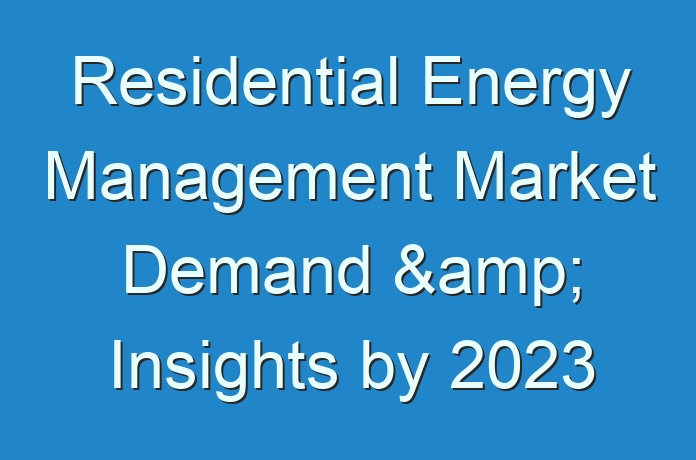
Residential energy management solutions are cost effective and latest technology solutions designed to cater to the demand of reduction in energy consumption by residential customers. Residential energy management solutions consume less power and results in lower utility bills. Residential energy management solutions measure the energy consumption of home’s heating, cooling, lighting systems and individual appliances to uncover trends in electricity use and operate devices to get maximum savings. Consumers choose residential energy management solutions independently or at times data ownership rights and device control is assigned to third party Energy Management Service Providers (EMSPs).
Want to know the obstructions to your company’s growth in future? Request a brochure @ https://www.transparencymarketresearch.com/sample/sample.php?flag=S&rep_id=4557
Residential energy management Market is classified by communication technology as Wi-Fi, Ethernet and Home Area Networks (Z-Wave, ZigBee, Home Plug and others). Residential energy management market is segmented on the type of devices as smart meters, smart appliances, smart thermostat, load control switches, smart plugs, gateway and in-home display. On the basis of adoption of residential energy management solutions across various geographies, the market is classified as North America, Latin America, Europe, Middle-East and Africa and Asia Pacific.
Lighting controls, programmable thermostats, HVAC controllers and self-monitoring systems are the key solutions available in residential energy management market. According to U.S. Energy Information Administartion (EIA) residential sector account for 18% of total energy consumption globally, thus creating need for an energy management system. Residential energy market is currently immature; however, with increasing importance of home automation and control, the market is anticipated to have tremendous potential due to which is expected to have significant revenue opportunities in the near future.Under residential sector space heating and cooling, water heating consumes maximum energy and thus are the most targeted areas for energy management solutions.
Nowadays, companies which are dealing with energy consuming products or services are partnering with energy management solution providers to create new services in residential energy management sector; for instance, Comcast Corporation expanded in the residential energy space with an agreement with energy management solution provider EcoFactor, in February 2012. In accordance with this deal, Comcast Corporation will create a new service that optimizes the heating and cooling patterns of a home and integrates with the broadband and cloud-based platform. Recently, companies such as Ecofactor, Inc., OPOWER, Inc are providing analytics capabilities with residential energy management solutions. Analytical tools identify electricity and appliances usage patterns at consumer’s premises to manage energy efficiently.
Purchase Premium Research Report @ https://www.transparencymarketresearch.com/checkout.php?rep_id=4557<ype=S
Solar PV panels are one of the technologies reinventing the traditional residential power industry. High solar penetration has created ways for creating and storing energy. New electricity storage capabilities and enhanced energy management tools are supporting residential customers to control usage and lower costs. For instance, BenQ Solar’s PowerLegato is one of the residential energy storage systems in the market which helps in efficient energy utilization. Additionally, one of the recent trends in residential energy management is the ‘communicating thermostat’ solution which provides a means for two-way communication between the energy company\’s central office and the homes. In this way, the energy company can remotely monitor and adjust temperature settings. Companies such as Honeywell International Inc. are launching smart thermostats with geo-fencing capability to cater residential energy management market.
Some of the key players in the residential energy management market are Schneider Electric SE, General Electric Company, Comverge, Inc., Opower Inc., Elster Group, EcoFactor, Inc., Itron Incorporation, AlertMe.com Ltd, Landis+Gyr AG and Carrier Corporation among others.
Read Our Trending Press Release Below: https://www.prnewswire.com/news-releases/pandemic-trends-to-help-fiber-optic-connectors-market-develop-at-8-1-cagr-over-forecast-period-of-2019-to-2027–notes-tmr-301172733.html





